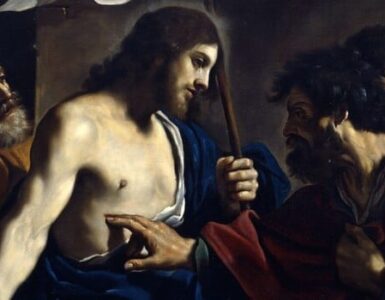Although coming home for Christmas is a beautiful holiday tradition greatly to be cherished, it nevertheless occurs to me that leaving home for Christmas, correctly understood, is equally or even more important.
When you think of it, leaving home certainly has good precedent. After all, as the time was drawing near for the first Christmas, Mary and Joseph packed a few belongings, left their home in Nazareth, and headed southward toward the Judean town of David called Bethlehem.
Joseph was obliged to go there by an edict from the emperor in far-off /Rome instructing Jewish men to travel to their ancestral towns in order to be counted in a census. But what about Mary? Why did she, well along in pregnancy as she was, undertake this arduous journey?
The answer which I suggest in my new book The Life of Jesus Christ is based on a prophecy, found in the Old Testament book of Micah, that the Messiah would be born in Bethlehem. From the time of the Annunciation nearly nine months earlier, Mary had linked that prophecy to her child. But how, she must have wondered, would God arrange for her to go to Bethlehem? Now the census provided the answer. So with Joseph, off to Bethlehem she went.
That’s fine for Mary and Joseph, someone may be thinking, but what’s it got to do with saying we should leave home for Christmas?
In answering that, let me begin with St. Paul’s words about the Incarnation. Imitate the humility of Christ, he tells the Philippians, “who, though he was in the form of God, did not count equality with God a thing to be grasped, but emptied himself, taking the form of a servant, being born in the likeness of men” (Phil 2:5-7). In doing this, Paul tells us, Jesus Christ gave us an example of humbling oneself for the sake of others that we are called to imitate.
To see what that means, consider another of my favorites, St. John Henry Newman, who in one of his Christmas homilies says this: “With a wonderful condescension Christ came…in weakness, in the form of a servant, in the likeness of that fallen creature whom he purposed to restore.” And in still another Christmas sermon, Newman draws the practical conclusion: we who call ourselves followers of Christ are meant to demonstrate in our lives “that we really are what we have been made, by renouncing the world while in the world, and living as in the presence of God.”
“At other seasons of the year,” he adds, “we are reminded of watching, toiling, struggling, and suffering; but at this season we are reminded simply of God’s gifts towards us sinners….We come to be made whole. We come as little children to be fed and taught.”
And that, neither more nor less, is what I mean when I speak of leaving home for Christmas–putting aside, at least for a little while, the deceptively comfortable “home” of distraction and alienation from the things of God and accepting, like little children as far as we can manage it, that wonderful gift of Christ’s self-giving in the Incarnation.
On that note allow me to conclude with this beautiful Christmas prayer by St. John Henry Newman:
“May each Christmas, as it comes, find us more and more like him, who as at this time became a little child for our sake, more simple-minded, more humble, more holy, more affectionate, more resigned, more happy, more full of God.”
Merry Christmas.
✠
Photo by Chad Madden on Unsplash













